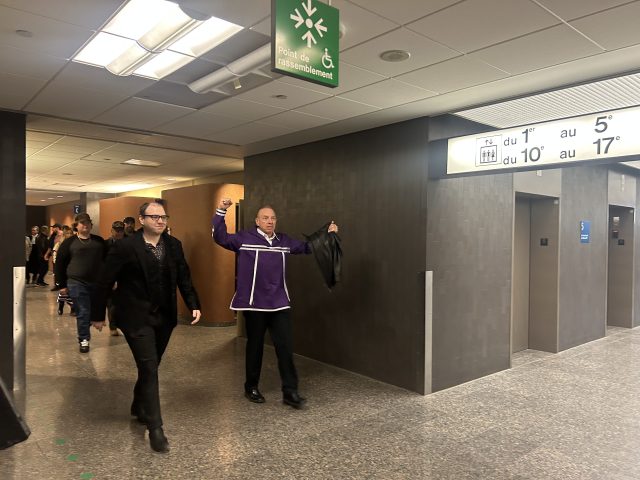After a gruelling, more than seven-year legal battle, Derek White and Hunter Montour were granted a permanent stay of criminal procedures this week by a Quebec Superior Court judge, who recognized the role of traditional law, including the Covenant Chain, in the tobacco trade across Turtle Island.
“It’s been long, it took a toll on our whole family, but I always said we’d have our day in court, and today was our day. And we won what we set out to do,” White told The Eastern Door after the victory on Wednesday morning.
Judge Sophie Bourque read aloud her decision before going over a 25-page summary of how she came to her conclusion, asking the packed courtroom to refrain from reacting to the judgement until she was done reading. She took 18 months to consider the evidence before giving her decision.
She found that the 2001 Excise Act, at the crux of the criminal charges against Montour and White, infringes on treaty rights and inherent rights the applicants have as Indigenous people. She concluded that the act “is of no force and effect against them” and therefore permanently stayed criminal proceedings against the two, meaning neither will face jail time for their 2016 arrests as part of Project Mygale.
She also overturned a previous monumental Supreme Court decision in favour of a more contemporary test to establish Indigenous rights in future legal contexts.
More than seven years
Project Mygale is, to date, the largest tobacco-smuggling bust in North America, which saw 60 people, including Montour and White, arrested as part of a massive international police investigation involving both Canadian and American forces. Police alleged that international crime rings were smuggling tobacco into Canada without paying excise duties, and alleged that White was at the head of one of the crime rings involved.
White, who denied involvement in any organized crime ring, was ultimately found not guilty of defrauding the government of Quebec out of $44 million in unpaid tobacco charges in 2019, but he was found guilty of conspiracy to commit fraud and profiting from organized crime in relation to the excise taxes, with Montour found guilty of aiding organized crime.
White was facing 14 years in prison, with Montour facing five.
The two decided to launch a constitutional challenge, arguing that they are exempt from the Excise Act as Indigenous people and that the tobacco trade is protected by various historical treaties, the result of which is this week’s win in court.
“It’s surreal. I still had goosebumps this morning thinking about it,” said White’s lawyer, Vincent Carney, the day after the ruling.
The Covenant Chain
Carney and the rest of the applicants’ legal team argued that 10 treaties negotiated between 1664 and 1760 guarantee Kanien’kehá:ka a right to the tobacco trade. They argued that these treaties, forming the overarching Covenant Chain, are protected under Section 25 of the Constitution Act.
The Attorney General of Quebec and Attorney General of Canada, however, said they were strongly opposed to the argument that the Covenant Chain is a treaty, arguing instead it is a symbol or metaphor for political and military alliance in the 17th and 18th centuries. But the Court ruled that the Chain is “an unextinct treaty that creates mutually binding obligations,” ultimately siding with White and Montour and against the Attorneys General.
“She’s recognized that the treaties don’t just protect a modest economic activity or a subsistence right to hunt or fish. She’s recognized a really vast commercial right that is constitutionally protected as a result of treaties and Aboriginal rights,” said Carney. “That’s what makes its implications so significant.”
The judge also made clear that the Covenant Chain is a living, breathing treaty, contemporarily applicable regardless of how old it is.
“The evidence shows that the Covenant Chain is an agreement designed to last for perpetuity…Not only is there no evidence that the Haudenosaunee consented to the extinguishment of the Covenant Chain, but the evidence points to the contrary,” justice Bourque said.
She also noted that Indigenous people have a generic right to “freely pursue economic development by their own chosen means” – in this case, via the tobacco trade. She said that this right is “intimately tied to the survival and dignity of any nation” and that the court concludes that “the right to pursue economic development is indeed protected under the traditional legal system of the Mohawks of Kahnawake.”
Overturning a Supreme Court decision
Justice Bourque also overturned a Supreme Court decision, that of Van der Peet and Pamajewon. That case, from 1996, had originally dictated a test for establishing Indigenous rights known as the Van der Peet test.
However, Montour and White asked the Court to depart from that test and offer a new framework aimed at protecting contemporary Indigenous practices.
The Judge found that the Van der Peet test, which contains 10 criteria that must be met in order for a practice to be deemed a constitutionally-protected Indigenous right, is outdated, as Indigenous cultural practices within that framework are situated solely in the past.
She found that the United Nations Declaration on the Rights of Indigenous Peoples (UNDRIP) recontextualizes the test, and thus constructed a new test with three steps, identifying the collective rights an individual is invoking and identifying how that right is protected by traditional legal systems.
“To articulate a new test for Aboriginal rights on top of recognizing treaty rights and the treaty relationship of the Covenant Chain, it’s a home run basically,” said Carney.
Reactions
The atmosphere outside the courtroom on Wednesday was triumphant, as White and Montour exited the courtroom to whoops and cheers from community members who had travelled from Kahnawake to the city to hear the judgement. So many people were in attendance that the court had to set up an overflow room, where proceedings were livestreamed, since there were no seats left inside the courtroom.
“It feels good. Whether the judgement was going to go the opposite way, or this way, it was really good to see that I have family, friends from all over that came up to support me,” Montour said. “I set the tone for the next arrest, we paved the road for everyone.”
Gerald Taiaiake Alfred, who was involved in the trial as an expert witness providing testimony about the historical nature of Haudenosaunee trade networks, said he was struck by the judgement.
“This is a huge victory. It shows that after careful consideration, after a long trial, with all the information and almost two years of thinking about this, that a Canadian judge validates our perspective and our knowledge,” he said.
“I felt a little bit of disbelief, but the most pronounced feeling I had was that of validation.”
Alfred underscored the massive risk that Montour and White took by committing to their fight for more than seven years.
“This is how nations are built, and this is how nations survive, is by taking risks…The real test is to put yourself out there on issues like this. Our ancestors used to go into battle and risk their lives to defend their nation. This isn’t that scenario, but it’s almost as serious. You’re risking your freedom, you’re risking jail for this,” he said.
“If you want to develop, if you want to make change, you have to risk something. They risked their freedom, their money…there’s huge implications.”
Carney added that he has already spoken to a lawyer who said he will be pleading this case in a few of his own proceedings, highlighting how this case will be used as an example in other tobacco trials going forward. He applauded the work of justice Bourque in reaching her decision.
“We were just so impressed with justice Bourque’s involvement throughout the trial. She was a very participatory judge who was respectful of all witnesses, and that level of engagement I thought was quite affirming,” he said. “I think the decision we have obtained reflects an engaged justice system, and I think everyone is better for it, ultimately.”
In the coming months and years, White hopes to enjoy a return to the world of NASCAR racing, as well as to travel across the US border, something that he hasn’t been allowed to do since his arrest in 2016.
“We have justice,” said White. “The judge finally realized that we are people. And we ain’t going anywhere.”
This article was originally published in print on Friday, November 3, in issue 32.44 of The Eastern Door.
This post was originally published on this site be sure to check out more of their content.











